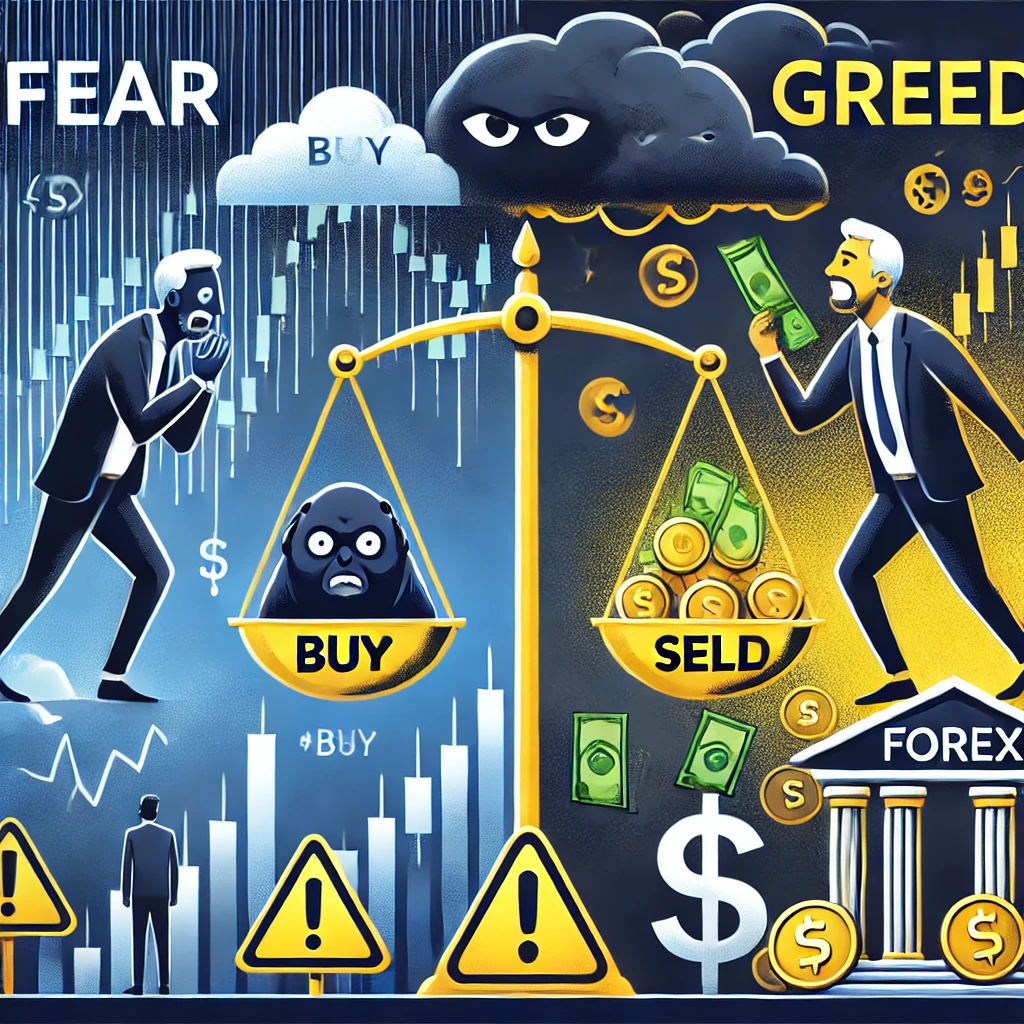Table of Contents
- What is Fear in Forex Trading?
- What is Greed in Forex Trading?
- The Impact of Fear and Greed on Forex Trading
- Tips to Overcome Fear in Forex Trading
- Strategies to Overcome Greed in Forex Trading
- Building Emotional Discipline
- The Importance of Continuous Improvement
- FAQ: Overcoming Fear and Greed in Forex Trading
- Conclusion

Overcoming fear and greed in forex trading:
Fear and greed are two of the strongest emotions that traders face, especially in the fast-moving world of forex trading. These emotions can lead to poor decisions that cost you money. In this article, we’ll explain what fear and greed are, how they affect forex trading, and simple steps to control them.
What is Fear in Forex Trading?
Fear in trading usually comes from the thought of losing money. This fear can be very strong for beginners, but even experienced traders feel it sometimes. Fear can make you hesitate to start a trade or quit a trade too soon, even when your analysis shows you should hold on.
What causes fear?
- Not enough knowledge: If you don’t fully understand the forex market, it’s natural to feel scared.
- Losing trades: If you’ve lost money in the past, it can shake your confidence.
- Using too much leverage: Leverage makes your trades bigger, but it also increases risk. This can make you more fearful.
For tips to manage fear, read: How to Control Fear in Forex Trading.
What is Greed in Forex Trading?
Greed is wanting to make as much money as possible, often leading to risky decisions. Greed can make you:
- Take unnecessary risks.
- Hold onto a winning trade for too long.
- Chase after trades without proper planning.
Signs of greed:
- Overtrading: Opening too many trades in a short time to make quick profits.
- Ignoring your plan: Forgetting your strategy in hopes of earning more.
- Revenge trading: Trying to recover losses by making impulsive trades.
The Impact of Fear and Greed on Forex Trading

Both fear and greed can disrupt your trading performance in significant ways. They often lead to:
- Poor decision-making: Emotional trading clouds your judgment, making it hard to follow your strategy.
- Inconsistent results: Fear and greed cause erratic behavior, which leads to unpredictable outcomes.
- Losses: When emotions take over, you’re more likely to make mistakes that cost you money.
Understanding the impact of these emotions is the first step to overcoming them. Learn more about the role of emotions in trading with our guide on Developing a Trading Journal.
Tips to Overcome Fear in Forex Trading
Here are some simple tips to control fear:
1. Learn About Forex Trading
The more you know, the more confident you will feel. Learn about:
- How the forex market works.
- How to use technical and fundamental analysis.
- Risk management strategies.
For easy-to-understand terms, visit: Forex Trading Glossary.
2. Start Small
Practice with a demo account or trade with a small amount of money. This lets you gain experience without much risk.
3. Use Stop-Loss Orders
Stop-loss orders automatically close a trade if the market moves against you by a set amount. This limits losses and reduces stress.
4. Follow a Trading Plan
A trading plan includes your entry and exit points, risk limits, and trade sizes. Following your plan keeps you focused.
Learn how to make one here: How to Develop a Forex Trading Plan.
5. Focus on the Process
Don’t worry about the result of a single trade. Instead, focus on following your strategy consistently..
Strategies to Overcome Greed in Forex Trading

There are effective ways to manage greed:
1. Set Realistic Goals
Instead of aiming for huge profits, set achievable targets. This reduces the temptation to overtrade or take unnecessary risks.
2. Use Take-Profit Orders
A take-profit order automatically closes your trade when it reaches a certain profit level. This helps you lock in gains without being tempted to stay in the trade for too long.
3. Follow a Risk Management Plan
Decide how much of your capital you are willing to risk on each trade, typically no more than 1-2%. Sticking to this rule helps you avoid taking excessive risks driven by greed.
To learn more about managing risks, visit: Forex Trading with Leverage.
4. Take Breaks
When you experience a series of wins, take a break to reflect and avoid becoming overconfident. Overconfidence often leads to greedy behavior.
5. Keep a Trading Journal
Write down the reasons for each trade, the outcome, and what you learned. Reviewing your journal helps you stay disciplined and identify patterns of greed.
Building Emotional Discipline
Emotional discipline is essential for overcoming fear and greed. Here’s how to develop it:
1. Practice Mindfulness
Mindfulness techniques, such as deep breathing or meditation, can help you stay calm and focused during trading.
2. Accept Losses as Part of Trading
Every trader experiences losses. Accepting this fact can help you avoid fear-driven or revenge-driven trading.
3. Stay Detached
Treat trading like a business. Avoid becoming emotionally attached to individual trades or outcomes.
4. Surround Yourself with Support
Join trading communities or find a mentor. Sharing experiences with others can provide perspective and reduce emotional pressure.
Explore our guide on creating the perfect trading space: Forex Trader Home Office Setup.
The Importance of Continuous Improvement
Overcoming fear and greed is not a one-time effort; it’s an ongoing process. Regularly evaluate your performance and emotional responses to trades. Identify areas where you can improve and adjust your strategies accordingly.
Key Takeaways about Overcoming fear and greed in forex trading:
- Fear and greed are natural but can be managed with the right approach.
- Education, risk management, and discipline are your best tools.
- Focus on long-term consistency rather than short-term wins.
FAQ: Overcoming Fear and Greed in Forex Trading
Q: Why are fear and greed so common in forex trading?
A: Forex trading involves money, risk, and uncertainty, which naturally trigger emotional responses like fear and greed. These emotions are part of human nature but can be managed with the right mindset and strategies.
Q: How can I reduce fear when trading?
A: Educate yourself about the market, start with small trades, use stop-loss orders, and follow a well-defined trading plan. These steps help minimize uncertainty and build confidence.
Q: What is the best way to control greed?
A: Set realistic profit goals, use take-profit orders, and stick to a risk management plan. Taking breaks and maintaining a trading journal can also help you stay disciplined.
Q: Can mindfulness really help in trading?
A: Yes, mindfulness techniques like deep breathing and meditation can help you stay calm, focused, and less reactive to emotional triggers while trading.
Conclusion
Fear and greed are common challenges in forex trading. By understanding these emotions and using the strategies in this article, you can make better decisions and trade with more confidence. Remember, successful trading is about smart, consistent choices. Master your emotions, and you’ll be on the path to becoming a skilled trader.
For additional trading insights, explore our top recommendations:
-
Overcoming fear and greed in forex trading
Overcoming fear and greed in forex trading:Fear and greed are two of the strongest emotions that traders face, especially in the fast-moving world of forex trading. These emotions can lead to poor decisions that cost you money. In this article, we’ll explain what fear and greed are, how they affect forex trading, and simple steps…
-
Trading with discipline and patience
Trading with discipline and patience: Trading in financial markets is an exciting and rewarding experience. However, it can also be difficult and stressful. Success in trading doesn’t happen by luck or guessing. Instead, it takes discipline, patience, and a good plan. Let’s look at why these qualities are so important and how they can make…
-
How to Control Fear in Forex Trading
How to Control Fear in Forex Trading: Fear is one of the most common emotions traders face in the forex market. Whether you’re a novice or an experienced trader, the fast-paced, high-stakes world of forex can evoke feelings of anxiety and hesitation. Fear can paralyze decision-making, lead to impulsive actions, and ultimately sabotage trading success.…



